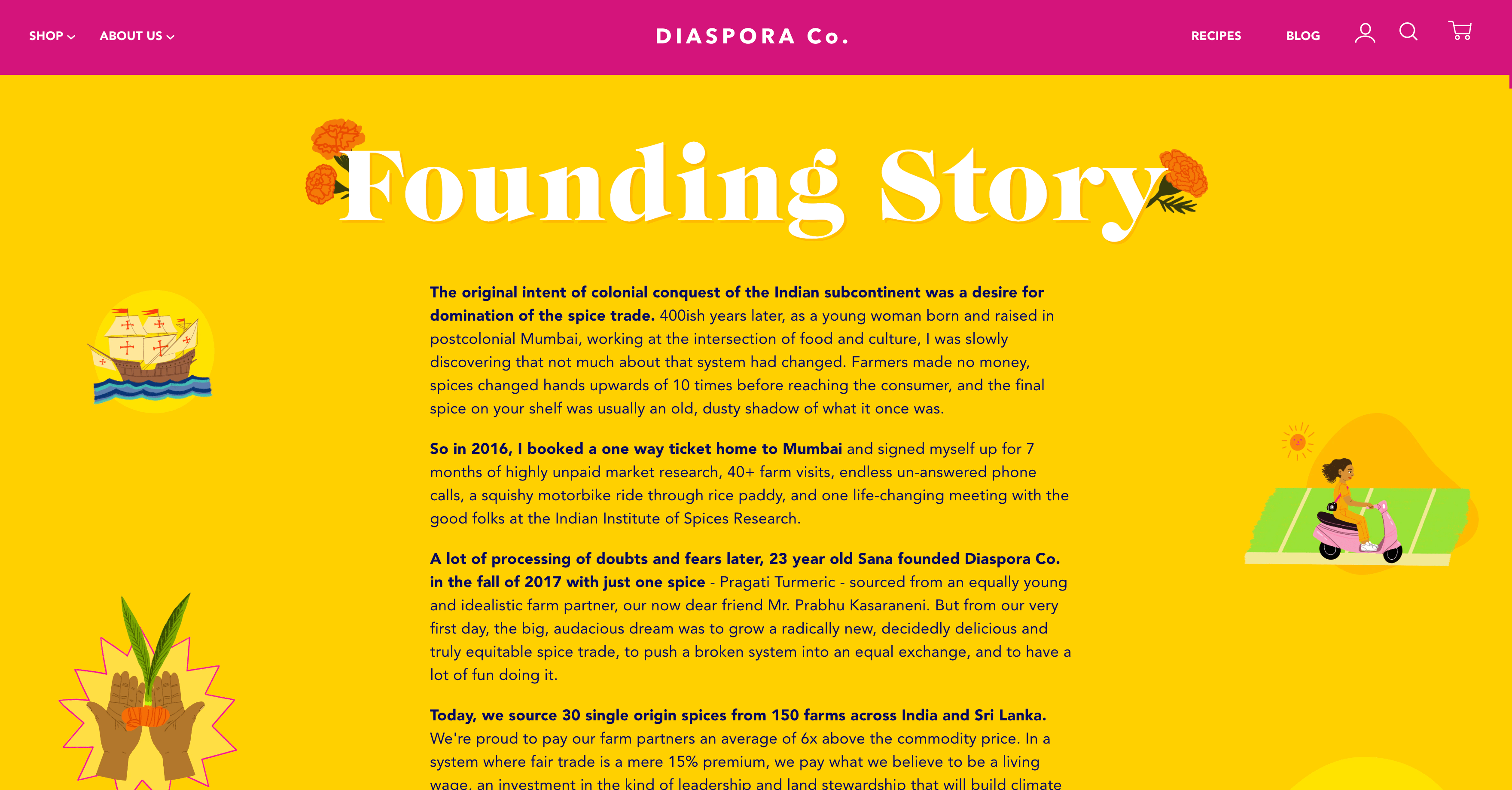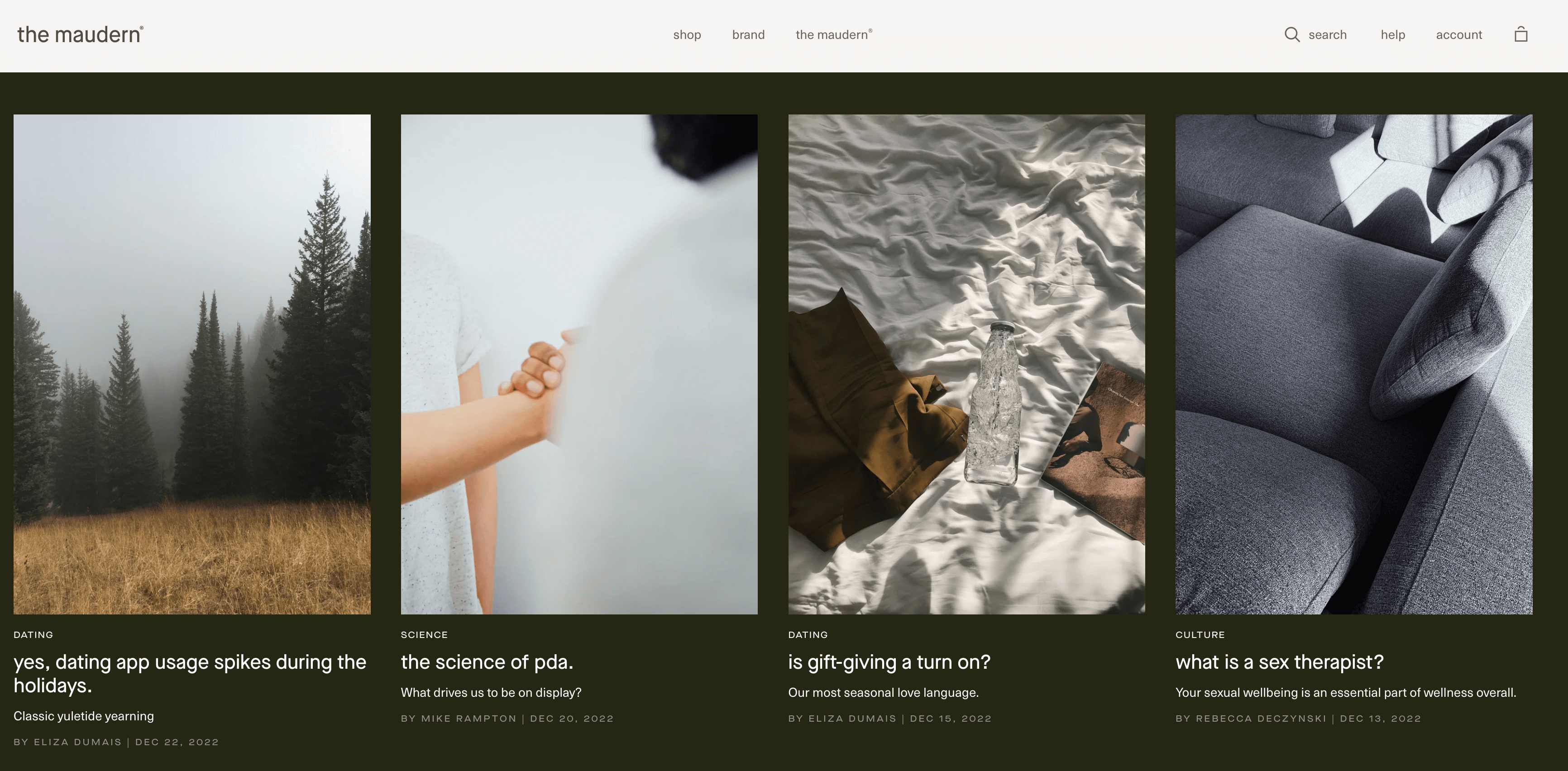Think of a brand you buy from time and time again. Maybe it’s your favorite cleaning product, clothing line, or pantry item.
What comes to mind when you think of the brand? Can you picture the brand logo? Its colors? Its product packaging when the item arrives at your home?
If the company in mind has a strong brand identity, chances are your answers to the above questions were a quick “yes.” Branding is how companies stay identifiable and loved by their customers—especially in today’s ecommerce world, where consumers are a click away from competitors. Want customers to be as loyal to your business as you are to brands you love? Here are several ideas on how to establish and amplify your brand identity.
Branding is important because it helps tell the story of your product.
What is branding?
Branding is the process of creating a unique identity for a company, product, or service. It often includes the creation of a name, logo, tagline, color scheme, and other visual and verbal elements to distinguish a business from its competitors. However, branding also goes beyond these basic elements: Smart branding speaks to the personality and long-term vision of a business, too.
As fashion writer and art editor Odessa Paloma Parker says, “Branding is important because it helps tell the story of your product—it communicates what your values are, your perspective, and helps illuminate small character elements that are part of the bigger picture of your business.”
Ultimately, whether you invest in creating a brand identity or not, you’re still going to have a brand. People will form an opinion of your company based on your business presence, product quality, customer service, digital marketing, and more. That’s why it’s important to think about your brand strategy and how you want your target customers to perceive your business from the start.
5 key visual elements of brand identity
The visual representation of a brand is a critical part of creating a strong and recognizable identity. Here are some key visual elements of a strong brand identity:
1. Logo
A brand logo is arguably the most recognizable element of your company’s visual identity. The logo can be a combination of symbols, numbers, and other visual references. It should be simple and memorable, giving your target customers an initial sense of who your company is and what it does.
2. Color scheme
The field of color psychology gives marketers and designers insight into how different colors impact potential customers’ moods and purchasing decisions. Most brands select a color palette based on their desired brand personality, brand values, and type of customer experience they want to communicate. For example, green evokes nature and harmony, and is often used by brands with a focus on wellness or sustainability. Blue is associated with trust and security, which is why it’s one of the most popular brand colors.
3. Typography
Typography is the way type is used in your brand's marketing materials—your choice of typefaces, and the sizes and weights you use of each. Your typography system should cover usage: when and where you use each typeface and their variations across all of your customer touchpoints. Which font is used for the headline on your website? Which is used on your social media graphics? Make sure these questions are answered clearly in your brand guidelines.
4. Videos, images, and graphics
Your use of visuals may include photography, icons, illustrations, video content, and more. Consider what type of visual makes the most sense for your brand to use. For example, if you’re an apparel brand, you likely want to invest in original photography of people wearing your clothes, while brands in other industries may lean more heavily on illustrations or graphics.
5. Product labels and packaging
Product label design defines the look and feel of your merchandise labels, and product packaging design defines how the containers that house your products look, feel, and function. Together, these two components create a tactile brand experience with your customers. As an ecommerce business, your product packaging is especially important, as it may be the first tangible interaction your target audience will have with your brand identity.
5 branding ideas to grow your business
How do you establish and communicate your brand identity? Here are five business branding ideas:
- Share your brand story
- Use social media
- Partner with influencers
- Create branded content
- Invest in a branding team
1. Share your brand story
Customers are more likely to engage with brands that have a compelling story. Think about the following questions: What inspired you to start this business? What are your core values? Who is your target audience? What is your long-term vision?
Spice company Diaspora Co.’s story is rooted in the personal experience of founder Sana Javeri Kadra. After leaving her hometown of Mumbai to work in food and culture in the San Francisco Bay Area, she realized how little had changed in the spice trade since the colonial occupation of India. As the brand’s founding story page explains, Sana embarked on seven months of research to understand how the current spice market worked—visiting more than 40 farms and meeting with people at the Indian Institute of Spices Research—before deciding to launch Diaspora Co. with a single-origin spice directly from a farmer: Pragati turmeric. The company now offers more than 30 spices from over 150 farms across India and Sri Lanka.

2. Use social media
Social media channels provide an opportunity to connect with potential customers, share your brand story, and showcase your products and services—using both online ads and organic engagement.
Glossier, named the “beauty brand for generation instagram” by Forbes, is a well-known example of a brand that built a cult following on social media. It reposts user-generated content, such as selfies and skin care tutorials from real people using its products, on its social media page and offers peer referral discount codes, building strong and loyal relationships with young consumers.
3. Partner with influencers
Related to social media, influencer marketing is an effective way to reach new target audiences and build a strong brand identity. After identifying influencers whose content and audience align with your brand’s goals, you can reach out to send products as gifts, exchange products for social media posts, or pay for sponsored posts.
Healthish, a health product company, is one of many successful brands that uses influencers to launch new products, like its signature water bottle. “We’re in a fortunate position where the product is relatively low cost,” Nathan explained in a Shopify Masters podcast episode. “We just send out [products] to many subsections of the market.”
4. Create branded content
Creating branded content, such as a blog post, video content, or podcast, can help you establish yourself as a thought leader in your industry, while providing valuable content to your customers.
Maude, a sexual wellness brand created to simplify intimacy with inclusive and body-safe essentials, amplifies their brand with a blog called the Maudern. In support of its mission to normalize conversations about sexuality, it publishes weekly articles exploring modern intimacy through arts, science, and relationships. Its branded content integrates relevant products, making it easy for readers to navigate between the ecommerce site and the Maudern.

5. Invest in a branding team
A branding team can provide you with outside perspective and honest feedback on your company identity and direction. Need help finding a team? Shopify can connect you to brand strategy experts to conduct market research and help you define your positioning.
It doesn’t always have to be a hired expert, though. In the early days, your “branding team” could also be an informal focus group of trusted friends. As designer Andrew Coimbra, whose eponymous label makes genderless and women’s clothes, shares, “Part of knowing your brand is knowing who can help you build it. I’ve been extremely lucky [having] people in my life whose perspectives are well-curated and valid. I would suggest finding a core group of friends, or a team of people who have skills that are beneficial to you. Grow and learn with each other.”

Tools that can help your branding efforts
There are various products and apps that can help you create and maintain a strong brand identity:
- Online design tools, such as Canva or Adobe Express, offer a range of templates, images, and assets to develop brand marketing materials like social media posts, online ads, flyers, email marketing templates, packaging, and more. They enable you to easily make visual assets for your brand, whether you’re a skilled graphic designer or have no design expertise.
- Logo generators can help you create a logo design from scratch or based on a template. There are a number of free and paid logo generator options online.
- Ecommerce platforms, like Shopify, offer website templates that make it easy to browse and select a theme that is aligned with your brand identity.
Branding ideas FAQ
How can a business develop a strong brand identity?
At the most basic level, you can start developing your brand by creating a name, logo, tagline, color scheme, and other visual and verbal elements to distinguish a business from its competitors. All of these elements should consider your brand personality, brand values, and long-term vision.
What role does branding play in a company’s overall marketing strategy?
Branding is the foundation of your marketing strategies. It informs your voice and tone, as well as the visual elements of your marketing materials. In many ways, the success of your marketing strategy depends on whether it has successfully communicated your desired brand message.
How can a business measure the success of its branding efforts?
Each company’s definition of success will vary. However, some typical ways of evaluating branding efforts include conducting market research, analyzing growth and engagement on digital marketing channels (such as social media sites), and using a brand tracking tool that notifies you when your brand is mentioned.
How can a brand maintain consistency across multiple channels and platforms?
Brand consistency helps build recognition and trust with consumers. Develop a guiding set of branding strategies that you can use across all of your digital marketing channels. Your use of visuals, like logos, colors, and type, should be consistent, as should the voice and tone of your brand. Additionally, you can regularly audit your marketing efforts, such as banner ads, emails, or social media channels, to ensure your brand is being represented consistently and effectively.
How does branding impact customer perception and loyalty?
Smart branding shapes how customers perceive your company. If the perception is positive, it can improve customer loyalty by growing brand awareness, building repeat business, and inspiring word-of-mouth marketing and referrals.





